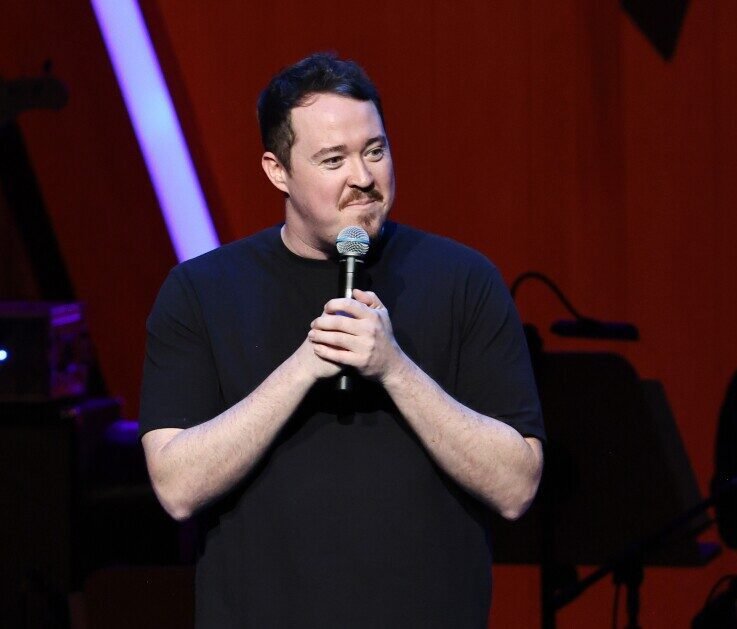Shane Gillis, the comedian, made a return to Saturday Night Live almost five years after being let go due to controversies surrounding his past racist and transphobic jokes. During his SNL comeback, Shane Gillis spent little time addressing his controversial past or his comedy career.
Humorously discouraging the audience from looking up his history, he quipped, Don’t look that up. If you don’t know who I am, please don’t Google that. Instead of bragging or delivering confrontational jokes,shane Gillis swiftly moved on, offering a light opening monologue with subtle attempts at mischief. He touched on the theme that every little boy is just their mom’s gay best friend and shared a lighthearted observation about the happiness of individuals with Down syndrome, including his own relatives.
As Shane Gillis continued talking, he seemed more and more uncomfortable, which is a bit odd for a comedian who usually acts a bit awkward and goofy on stage. He made jokes about expecting more laughter for some of his jokes, even mentioning, This place is really bright. I can see everyone not enjoying it.Sometimes, the laughter you hear on TV seems louder than what the performers can hear on stage.
Shane Gillis on SNL Saturday Night Live.

A smart move
But in some ways, it was a smart move considering the criticism Saturday Night Live received for having him as a host. People who knew about the complaints but didn’t check the podcasts where he made offensive comments probably watched his talk and were confused about why there was so much fuss.
shane Gillis might be trying something challenging in today’s media world where everything, including podcasts and stand up shows, gets recorded and shared – speaking to his main audience in a way that’s more direct and provocative than the comedy he does for a broader audience, like his Netflix special or Saturday Night Live.
Unfortunately, I listened to some of that podcast stuff before watching the SNL episode. So, when I saw him making jokes about his sister adopting three Black children and marrying an Egyptian man, saying visiting their house was like getting in the craziest Uber pool you’ve ever been in, it made me feel skeptical. He also talked about how his family opened a coffee shop where people with Down syndrome can work.
The joke that got the biggest laugh was about his niece with Down syndrome being insulted by a white kid at school, and then a group of three Black kids come out of nowhere and start pummeling that guy. Why would they do that? And why does race matter here? I know – I’m overthinking. But it felt like a lazy way to give the crowd a joke about a mean white person getting some payback.
A lot of it seemed like shane Gillis trying to protect himself from criticism and avoid any jokes that could bring back the backlash. But since he didn’t really explain or talk about the controversy around his appearance, it felt like he missed an opportunity or avoided the topic.
My skepticism continued to the other parts of the show, which often felt like they were inspired by the long, meandering jokes from his podcasts. This included a sketch where Gillis plays the head of a white family visiting a Black church in Jamaica, letting him use a bad Jamaican accent for a few jokes. There was also a game show where he acted like a white man who pretended not to recognize Martin Luther King Jr. and Oprah because he was afraid of saying the wrong name on TV. One of his opponents was a Black woman who didn’t recognize the Mona Lisa or Michelangelo’s statue of David, which felt even worse.
The history of comedy rebels
Saturday Night Live became famous as a group of comedy rebels making fun of a stiff political and media establishment, mocking corrupt and ineffective politicians from Richard Nixon to Sarah Palin; in other words, making fun of those in power.
But today’s comedy rebels view the push for comedians to avoid insulting slurs about marginalized people as the new establishment — building successful podcasts, stand-up tours, and more on the mistaken belief that avoiding racism, sexism, and homophobia somehow restricts their freedom of speech. In this view, making fun of those who are already facing challenges is considered fair and quite profitable.
I would be more open-minded about all of this if I thought these comedians were bringing something new to the table about race, gender, or society. If they were pushing boundaries to introduce fresh ideas — instead of complaining about how they’re not allowed to be crude — at least we could be discussing important comedic concepts.
But when shane Gillis just aired on SNL, it felt like he was settling different people and even making light jokes about liberal ideologies. This cleverly allows the legendary boss Lorne Michaels to keep the feeling of rebellion as a lawbreaker rather than a top person on comedy shows.

